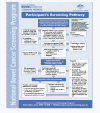Australia's national bowel cancer screening program: does it work for indigenous Australians?
- PMID: 20579344
- PMCID: PMC2915957
- DOI: 10.1186/1471-2458-10-373
Australia's national bowel cancer screening program: does it work for indigenous Australians?
Abstract
Background: Despite a lower incidence of bowel cancer overall, Indigenous Australians are more likely to be diagnosed at an advanced stage when prognosis is poor. Bowel cancer screening is an effective means of reducing incidence and mortality from bowel cancer through early identification and prompt treatment. In 2006, Australia began rolling out a population-based National Bowel Cancer Screening Program (NBCSP) using the Faecal Occult Blood Test. Initial evaluation of the program revealed substantial disparities in bowel cancer screening uptake with Indigenous Australians significantly less likely to participate in screening than the non-Indigenous population.This paper critically reviews characteristics of the program which may contribute to the discrepancy in screening uptake, and includes an analysis of organisational, structural, and socio-cultural barriers that play a part in the poorer participation of Indigenous and other disadvantaged and minority groups.
Methods: A search was undertaken of peer-reviewed journal articles, government reports, and other grey literature using electronic databases and citation snowballing. Articles were critically evaluated for relevance to themes that addressed the research questions.
Results: The NBCSP is not reaching many Indigenous Australians in the target group, with factors contributing to sub-optimal participation including how participants are selected, the way the screening kit is distributed, the nature of the test and comprehensiveness of its contents, cultural perceptions of cancer and prevailing low levels of knowledge and awareness of bowel cancer and the importance of screening.
Conclusions: Our findings suggest that the population-based approach to implementing bowel cancer screening to the Australian population unintentionally excludes vulnerable minorities, particularly Indigenous and other culturally and linguistically diverse groups. This potentially contributes to exacerbating the already widening disparities in cancer outcomes that exist among Indigenous Australians. Modifications to the program are recommended to facilitate access and participation by Indigenous and other minority populations. Further research is also needed to understand the needs and social and cultural sensitivities of these groups around cancer screening and inform alternative approaches to bowel cancer screening.
Figures
References
-
- AIHW, AACR. Cancer in Australia: an overview, 2008. Canberra. 2008. Volume Cancer series no. 46.
Publication types
MeSH terms
LinkOut - more resources
Full Text Sources
Medical


